UniApp realizes the perfect integration of the Vue.js framework
Introduction:
UniApp is a cross-platform development tool based on the Vue.js framework. It can compile a Vue.js project into multiple Applications for different platforms, such as iOS, Android, applets, etc. The advantage of UniApp is that it allows developers to write only one set of code to adapt to multiple platforms at the same time, speeding up development efficiency and reducing development costs. The following will introduce how to use UniApp to achieve perfect integration of the Vue.js framework, with code examples attached.
1. Environment setup:
First, you need to install Node.js and Vue CLI. Node.js is a Javascript running environment used to install and manage UniApp related dependencies. Vue CLI is a scaffolding tool for creating Vue.js projects. After the installation is complete, enter the following command to install UniApp CLI:
npm install -g @vue/cli @vue/cli-service-global
2. Create a UniApp project:
Use Vue CLI to create a new UniApp project. Enter the following command on the command line to initialize the project:
vue create -p dcloudio/uni-preset-vue my-project
Here, we selected UniApp’s official preset template uni-preset-vue. Then, enter the project directory:
cd my-project
3. Write Vue.js components:
In the src directory, we can see a pages directory, which is used to place our page components. Create a directory named index in the pages directory, and then create an index.vue file in this directory. In index.vue, we can write Vue.js code as follows:
<template>
<view>
<text>Welcome to UniApp</text>
</view>
</template>
<script>
export default {
}
</script>
<style>
</style>In this code, we use the tag to define the HTML structure of the page,
4. Configure routing:
In UniApp, you can jump between pages by configuring routing. In the src directory, create a new file named router.js, and then write the following code:
import Vue from 'vue'
import Router from 'uni-simple-router'
Vue.use(Router)
const router = new Router({
routes: [{
path: '/pages/index/index',
name: 'index'
}]
})
router.beforeEach((to, from, next) => {
next()
})
export default routerIn this code, we first introduce Vue and uni-simple-router, and use Vue.use( ) to register. Then, create a router instance and define a route named index using the routes configuration. Finally, route interception is performed through the router.beforeEach() method to ensure that some operations are performed before each route switch.
5. Configure the entry file:
In the src directory, open the main.js file and write the following code:
import Vue from 'vue'
import App from './App'
import router from './router'
Vue.config.productionTip = false
const app = new Vue({
...App,
router
})
app.$mount()
export default {
config: {
pages: [
'pages/index/index'
],
window: {
backgroundTextStyle: 'light',
navigationBarBackgroundColor: '#fff',
navigationBarTitleText: 'UniApp',
navigationBarTextStyle: 'black'
}
}
}In this code, the Vue and App components are first introduced. And configured the router in the Vue instance. Then, create a Vue instance through new Vue(), mount it to the app, and finally mount the Vue instance to the page through app.$mount(). In the export default section, we configure the page's entry file and related window styles.
6. Run the UniApp project:
Enter the following command in the command line to run the UniApp project:
npm run dev:mp-weixin
Here we have chosen to run the UniApp project of the WeChat applet version. If you need to run For other versions, you can add corresponding parameters after the command, such as dev:h5, dev:app, etc.
Through the above steps, we have successfully achieved the perfect integration of UniApp and the Vue.js framework. Developers can write Vue.js code through UniApp and use UniApp to compile it into applications for multiple different platforms. In this way, developers only need to write one set of code to adapt to multiple platforms at the same time, which greatly improves development efficiency and reduces development costs.
Summary:
UniApp is a cross-platform development tool based on the Vue.js framework, through which a Vue.js project can be compiled into multiple applications for different platforms. In this article, we introduce how to use UniApp to achieve perfect integration of the Vue.js framework and provide corresponding code examples. I hope this article can help developers understand and use UniApp and facilitate their cross-platform development.
The above is the detailed content of UniApp realizes perfect integration of Vue.js framework. For more information, please follow other related articles on the PHP Chinese website!
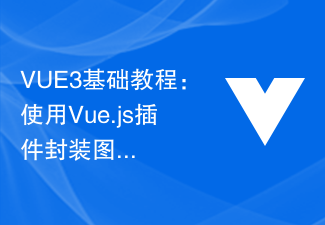 VUE3基础教程:使用Vue.js插件封装图片上传组件Jun 15, 2023 pm 11:07 PM
VUE3基础教程:使用Vue.js插件封装图片上传组件Jun 15, 2023 pm 11:07 PMVUE3基础教程:使用Vue.js插件封装图片上传组件Vue.js是一款流行的前端框架,它使开发者可以用更少的代码创建更高效、灵活的应用程序。尤其是在Vue.js3发布之后,它的优化和改进使得更多的开发者倾向于使用它。这篇文章将介绍如何使用Vue.js3来封装一个图片上传组件插件。在开始之前,需要先确保已经安装了Vue.js和VueCLI。如果尚未安装
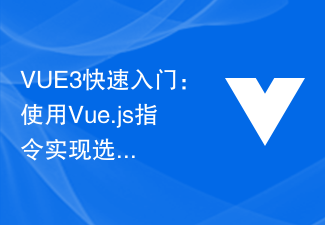 VUE3快速入门:使用Vue.js指令实现选项卡切换Jun 15, 2023 pm 11:45 PM
VUE3快速入门:使用Vue.js指令实现选项卡切换Jun 15, 2023 pm 11:45 PM本文旨在帮助初学者快速入手Vue.js3,实现简单的选项卡切换效果。Vue.js是一个流行的JavaScript框架,可用于构建可重用的组件、轻松管理应用程序的状态和处理用户界面的交互操作。Vue.js3是该框架的最新版本,相较于之前的版本变动较大,但基本原理并未改变。在本文中,我们将使用Vue.js指令实现选项卡切换效果,目的是让读者熟悉Vue.js的
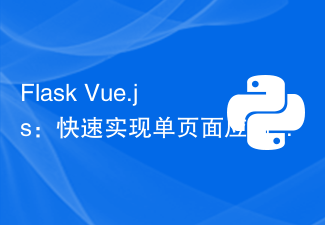 Flask + Vue.js:快速实现单页面应用Jun 17, 2023 am 09:06 AM
Flask + Vue.js:快速实现单页面应用Jun 17, 2023 am 09:06 AM随着移动互联网和Web技术的迅速发展,越来越多的应用需要提供流畅、快速的用户体验。传统的多页面应用已经无法满足这些需求,而单页面应用(SPA)则成为了解决方案之一。那么,如何快速实现单页面应用呢?本文将介绍如何利用Flask和Vue.js来构建SPA。Flask是一个使用Python语言编写的轻量级Web应用框架,它的优点是灵活、易扩
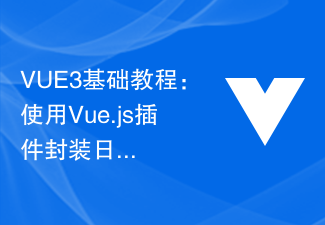 VUE3基础教程:使用Vue.js插件封装日历组件Jun 15, 2023 pm 09:09 PM
VUE3基础教程:使用Vue.js插件封装日历组件Jun 15, 2023 pm 09:09 PMVue.js是现代化的前端JavaScript框架之一,它提供了一套完整的工具来构建交互式用户界面。在Vue.js的生态系统中,有各种各样的插件和组件,可以大大简化我们的开发流程。在本篇文章中,我们将介绍如何使用Vue.js插件封装一个日历组件,以方便我们在Vue.js项目中快速使用。Vue.js插件Vue.js插件可以扩展Vue.js的功能。它们可以添加全
 Vue.js实现登录验证的完整指南(API、JWT、axios)Jun 09, 2023 pm 04:04 PM
Vue.js实现登录验证的完整指南(API、JWT、axios)Jun 09, 2023 pm 04:04 PMVue.js是一种流行的JavaScript框架,用于构建动态Web应用程序。实现用户登录验证是开发Web应用程序的必要部分之一。本文将介绍使用Vue.js、API、JWT和axios实现登录验证的完整指南。创建Vue.js应用程序首先,我们需要创建一个新的Vue.js应用程序。我们可以使用VueCLI或手动创建一个Vue.js应用程序。安装axiosax
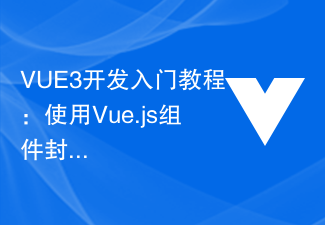 VUE3开发入门教程:使用Vue.js组件封装chart图表Jun 15, 2023 pm 10:29 PM
VUE3开发入门教程:使用Vue.js组件封装chart图表Jun 15, 2023 pm 10:29 PM随着大数据时代的到来,数据可视化已经成为了现如今的趋势之一。在Web前端开发的过程中,如何使用Vue.js进行数据可视化处理,成为了许多前端开发者所关注的问题。本文将会介绍如何使用Vue.js组件,封装基于chart.js库的图表。1.了解chart.jsChart.js是一款基于HTML5CanvasElement的简单易用、跨平台的开源图表库,我们可
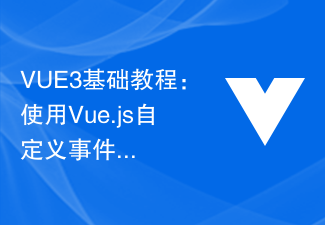 VUE3基础教程:使用Vue.js自定义事件Jun 15, 2023 pm 09:43 PM
VUE3基础教程:使用Vue.js自定义事件Jun 15, 2023 pm 09:43 PMVue.js是一款流行的JavaScript框架,它提供了很多方便的特性,所以它在开发Web应用程序时非常有用。Vue.js中的自定义事件系统使其更加灵活,并且可以通过组件事件触发和处理来实现更好的代码重用性。在本文中,我们将讨论如何使用Vue.js的自定义事件。Vue.js中自定义事件的基础在Vue.js中,我们可以通过v-on指令来监听DOM事件。例如,
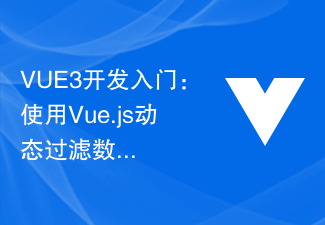 VUE3开发入门:使用Vue.js动态过滤数据列表Jun 15, 2023 pm 09:10 PM
VUE3开发入门:使用Vue.js动态过滤数据列表Jun 15, 2023 pm 09:10 PMVue.js已经成为现代Web开发的中流砥柱。它是一个轻量级的JavaScript框架,提供了数据绑定和组件化的能力,使得开发者能够更加轻松地构建交互型应用程序。而现在,Vue.js的新版本VUE3也已经面世。在本文中,我们将使用VUE3,通过实例,介绍如何在Vue.js中实现动态过滤数据列表。1.准备工作在开始本教程之前,您需要先安装Node.js和Vue


Hot AI Tools

Undresser.AI Undress
AI-powered app for creating realistic nude photos

AI Clothes Remover
Online AI tool for removing clothes from photos.

Undress AI Tool
Undress images for free

Clothoff.io
AI clothes remover

AI Hentai Generator
Generate AI Hentai for free.

Hot Article

Hot Tools

SublimeText3 English version
Recommended: Win version, supports code prompts!

DVWA
Damn Vulnerable Web App (DVWA) is a PHP/MySQL web application that is very vulnerable. Its main goals are to be an aid for security professionals to test their skills and tools in a legal environment, to help web developers better understand the process of securing web applications, and to help teachers/students teach/learn in a classroom environment Web application security. The goal of DVWA is to practice some of the most common web vulnerabilities through a simple and straightforward interface, with varying degrees of difficulty. Please note that this software

mPDF
mPDF is a PHP library that can generate PDF files from UTF-8 encoded HTML. The original author, Ian Back, wrote mPDF to output PDF files "on the fly" from his website and handle different languages. It is slower than original scripts like HTML2FPDF and produces larger files when using Unicode fonts, but supports CSS styles etc. and has a lot of enhancements. Supports almost all languages, including RTL (Arabic and Hebrew) and CJK (Chinese, Japanese and Korean). Supports nested block-level elements (such as P, DIV),

Notepad++7.3.1
Easy-to-use and free code editor

PhpStorm Mac version
The latest (2018.2.1) professional PHP integrated development tool






